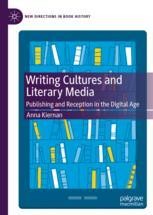Writing Cultures and Literary Media: Publishing and Reception in the Digital Age
As well as running The Lit Platform, Anna is Senior Lecturer in Creativity and Innovation and Director of the MA Creativity: Innovation and Business Strategy at the University of Exeter, UK. This book, published by Palgrave Macmillan, investigates the impact of the digital on literary culture through the analysis of selected marketing narratives, social media stories, and reading communities. Drawing on the work of contemporary writers, from Bernardine Evaristo to Patricia Lockwood, each chapter addresses a specific tension arising from the overarching question: How has writing culture changed in this digital age?
By examining shifting modes of literary production, this book considers how discourses of writing and publishing and hierarchies of cultural capital circulate in a socially motivated post-digital environment. Writing Cultures and Literary Media combines compelling accounts of book trends, reader reception, and interviews with writers and publishers to reveal fresh insights for students, practitioners, and scholars of writing, publishing, and communications.
Below, you can find an extract from the first two chapters, Introduction and Writing Culture and Cultural Value.
Want more? We’ll be sharing new chapter excerpts every week, so check back then for more on insights into publishing in a post-digital era.
1. Introduction
‘As an assistant editor at André Deutsch publishing in the 1990s, I worked on typed manuscripts scattered with seemingly cryptic proofreading marks across folios that had been delivered from the typesetter by courier. Now, of course, we edit online and author files are shared instantly, the paper trail having dried up. The piles of collated proofs heaped haphazardly in the corners of editors’ offices in Bloomsbury have long-since been recycled, archived or mythologised in memoirs. As a publisher, twenty years on, my workload has expanded from writing and editing to creating and sharing content, and it is these sorts of shifts which inform the practice-based approach in this book.” (Introduction, p.4)
2. Writing Culture and Cultural Value.
‘It is through the interplay of economic and symbolic capital that book publishing and the literary industries have historically found traction, since to have money but no network is almost as unavailing as having a notable reputation but no money.’ (ch. 2, p.9).
‘This fascination with the idea of embodied symbolic capital, in which well-connected (networked) cultural intermediaries have the ability to influence, is a recurring focus of Merchants of Culture and in some ways seems out of step with the contemporary sense of disillusionment with the privileged traditional gatekeepers within the literary industries… (ch 2. p.14)
‘Human-centred stories are both the beating heart of literary sociology and the publishing industry itself, and the romanticisation of the industry forms a through line in biographical references to the book trade.’ (ch. 2, p. 15)


